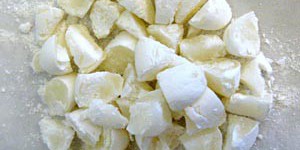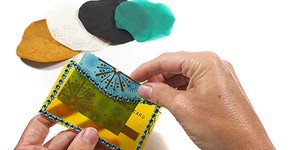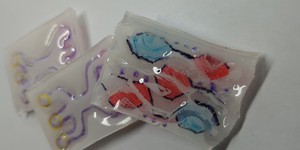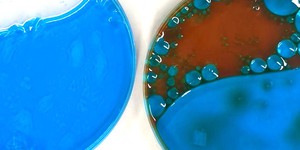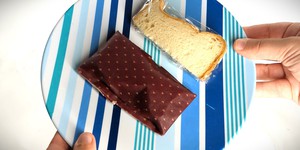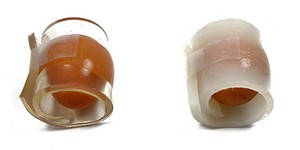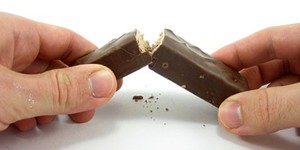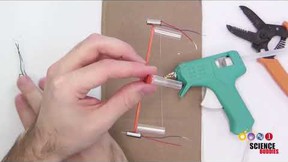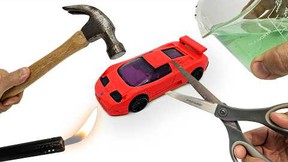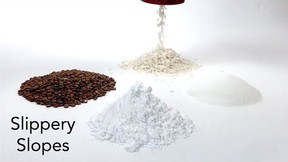Materials Science Science Projects (40 results)
Materials science is a fascinating area of research that is often at the cutting edge of science and engineering. It involves both developing new materials and improving on existing ones, and has important applications both for improving daily life and for advancing other fields of research. You can try your hand at making and testing all kinds of substances from plastic to slime.
|
Select a resource
Coding Projects
Sort by
|
What should you NOT forget when going outside on a sunny day? To put sunscreen on! Sunscreen is important because it protects your skin from sunburn. But there are so many sunscreens to choose from: different methods of application (sprays and lotions), different Sun Protection Factors (SPFs), and different ingredients. Which one is best? In this science project, you will test the effectiveness of different sunscreens and find out how water-soluble they are.
Read more
You have probably seen it on You Tube™ — the exploding Coke® and Mentos®
experiment. But what is it that makes the reaction happen, and what factors cause a larger or smaller
eruption? In this science project, you will see if using crushed
Mentos candies, instead of whole Mentos candies, will affect the reaction.
Read more
New
Are you ever annoyed by a poor Wi-Fi signal? What about when you try to send a text message, and it just won't go through because of poor cell service? Have you ever wondered what factors affect the strength of your signal and the speed of the connection? If so, this project is for you!
Read more
Can you imagine clothing, handbags, or shoes made from seaweed or spider silk? To become more sustainable, the textile industry is looking for ways to develop more eco-friendly fabrics. Biofabrics derived from living organisms such as seaweed or bacteria have been proposed as a potential alternative to conventional fibers. In this science project, you will make several biofabrics from alginate (seaweed) and conduct tests to find out which one is most suitable as a textile replacement.
Read more
Microfluidic devices are small tools used in different fields like engineering and biomedicine. Scientists and engineers use these devices to work with very tiny amounts of fluids for various experiments. These experiments can include things like biomedical research, creating new medicines, and even applications in the car industry. In this project, you will create and test your own microfluidic device design and compare it to other designs.
Read more
Can you catch a bubble with your hands? What if you use another material, like a piece of paper or aluminum foil? Try this science project to find out which materials can catch a bubble without popping it.
Read more
New
Have you ever walked next to your favorite ocean, lake, or creek and seen plastic waste everywhere? Have you ever thought about how much plastic breaks down into microplastics and pollutes waterways? Scientists are coming up with new ways to remove these microplastics from our waterways, and now you can test them out for yourself at home.
Read more
Do you ever use plastic wrap to cover a container? Did you know that it is made of plastic, which significantly contributes to the amount of waste in our landfills? There are many alternatives to plastic, and one popular product is beeswax wraps. Are beeswax wraps a suitable replacement for plastic wrap? Find out in this experiment!
Read more
Many foods, such as fresh fruits, vegetables, or eggs, are packaged in plastic to protect them from damage during handling and transport. But is plastic the best choice? What if a more sustainable and biodegradable material could replace it? Researchers have begun exploring hydrogels—squishy materials that can hold a lot of water—as alternative packaging materials. In this science project, you will make your own hydrogels from gelatin and cornstarch and investigate what ratio of…
Read more
It's hard to imagine a world without paper. You wouldn't have things like books, cards, comics, newspaper, construction paper, notebooks, cereal boxes, or that nice sound of shredding wrapping paper on your birthday. There was a time, though, when the only thing people had to write on were slabs of soft, squishy clay. When these slabs dried in the sun, they preserved simple ideas, but they were heavy, like carrying around a load of rocks. Not exactly easy to put in your pocket and carry around.…
Read more
Plastics are made of polymers, chemical structures containing many repeated subunits. How does the polymer type of a plastic affect the biodegradability of the plastic? Do research on how plastic is made and what types of polymers are used for making different plastics. Can you learn to make your own plastic? What materials can you use for making plastic that is biodegradable? Test biodegradability by burying plastic samples for different lengths of time. (Kadar, 2004) Reducing solid waste and…
Read more
Have you ever broken a candy bar in half to share with someone? Some might snap in half quite cleanly, but others might be gooey and flexible. If you stick a candy bar in the freezer, will this change how the materials break? Try this sweet project to find out!
Read more
|



